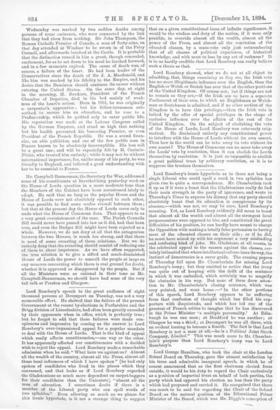Lord Rosebery's speech to the great audience of eight thousand
persons at Devonport on Tuesday, was not a very memorable effort. He showed that the failure of the present Government at the recent by-elections in Forfarshire and the Brigg division of Lincolnshire, had often been greatly exceeded by their opponents when in office, which is perfectly true ; but he forgot to add that these failures were made con- spicuous and impressive by coming as the answer to Lord Rosebery's over-impassioned appeal for a popular mandate to deal with the House of Lords. That is the kind of appeal which really affects constituencies,—one way or the other. It has apparently affected our constituencies with a decided wish to reject the appeal. Lord Rosebery made a remarkable admission when he said, " What have we against us P Almost all the wealth of the country, almost all the Press, almost all these local influences of which I have spoken" [he had only spoken of candidates who lived in the places which they canvassed, and that looks as if Lord Rosebery regarded the Gladstonians as much more dependent on carpet-baggers for their candidates than the Unionists], "almost all the men of education. I sometimes doubt if there is a member of the Liberal' party who can spell words of two syllables." Even allowing as much as we please for this ironic hyperbole, is it not a strange thing to suggest that on a given constitutional issue of infinite significance, it would be the wisdom and duty of the nation, if it were only possible, to override almost all the wealth, almost all the power of the Press, and almost all the conviction of the educated classes, by a mass-vote only just outnumbering that of all (lasses of political experience, of historical knowledge, and with most to lose by any act of rashness P is to us hardly credible that Lord Rosebery can really believe such a thesis as that.








































 Previous page
Previous page